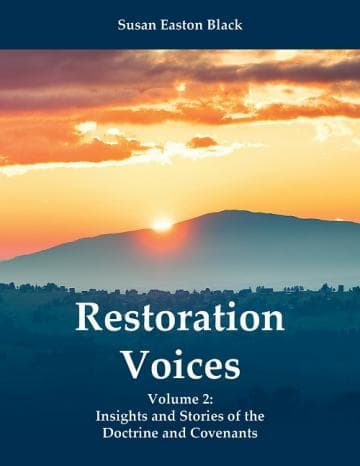Book
140 Chapters

On March 28, 1835, the Prophet Joseph Smith received this revelation on priesthood. Within the revelation is a defining explanation of the role of the Twelve Apostles:
The twelve traveling councilors are called to be the Twelve Apostles or special witnesses of the name of Christ in all the world—thus differing from other officers in the church in the duties of their calling. And they form a quorum, equal in authority and power to the three presidents. (D&C 107:23–24)
The history of the call to the Twelve is as follows—six months after volunteers in Zion’s Camp had returned from Missouri to Kirtland, Brigham Young recorded, “My brother Joseph Young and myself had been singing after preaching in a meeting; and when the meeting was dismissed, Brother Joseph Smith said, ‘Come, go down to my house with me.’ ”[1] Brigham wrote simply, “We went and sung to him a long time, and talked with him.”[2]
At that private meeting, the Prophet Joseph told the Young brothers of a vision he had received of men who died of cholera in Zion’s Camp. He said, “Brethren, ... if I get a mansion as bright as theirs, I ask no more.” The prophet then wept before saying, “Brethren, I am going to call out Twelve Apostles. I think we will get together, by-and-by, and select Twelve Apostles, and select a Quorum of Seventies from those who have been up to Zion.”[3] The prophet instructed Brigham and Joseph Young to call a meeting the next Sunday of the brethren who had proven to the Lord their willingness to lay down their lives to redeem Zion.
Word spread quickly that a meeting was to be held on Saturday, February 14, 1835, at the newly constructed schoolhouse near the Kirtland Temple. Although the meeting was open to all Church members, the intent of the meeting was for “those who journeyed to Zion for the purpose of laying the foundation of its redemption.”[4] The schoolhouse was crowded. Joseph Smith opened the meeting by reading from the New Testament in the Book of John about the Lord’s servants being chosen and ordained that “ye should go and bring forth fruit, and that your fruit should remain: that whatsoever ye shall ask of the Father in my name he may give it you” (John 15:16).
After the opening prayer, the Prophet Joseph spoke of having seen in vision those who had succumbed to cholera and death in Zion’s Camp. Then he wept and with difficulty told of another vision of the calling and order of the Twelve. He testified that it was the will of the Lord that the Twelve be chosen from those who had been willing to lay down their lives to help the exiles of Jackson County.
Veterans of Zion’s Camp were invited to sit together. As others in attendance moved aside to make way for the veterans, the Prophet assured the assembly that it was the will of God that this meeting be held, for it was a meeting to ordain to the ministry men who had been tried like Father Abraham and proven themselves worthy. Following their singing of “Hark, Listen to the Trumpeters!” (the favorite song on the march to Zion), Joseph Smith prayed and the meeting was adjourned for an hour.
As the meeting commenced an hour later, the Prophet Joseph announced that the purpose of this meeting was so “the three witnesses of the Book of Mormon [could] pray each one and then proceed to choose twelve men from the church as Apostles to go to all nations, kindred, tongues and people.”[5] The Three Witnesses—Martin Harris, Oliver Cowdery, and David Whitmer—stood up, prayed together, and were blessed by the laying on of hands by the First Presidency of the Church.
Following the blessing, the Three Witnesses proceeded to choose twelve men “as apostles, to go to all the nations, kindreds, tongues, and people.”[6] Those named as apostles of the Lord Jesus Christ were Lyman Johnson, Brigham Young, Heber C. Kimball, Orson Hyde, David W. Patten, Luke Johnson, William E. McLellin, John F. Boynton, Orson Pratt, William Smith, Thomas B. Marsh, and Parley P. Pratt. Three of the Twelve were not present at the schoolhouse—Thomas B. Marsh, William E. McLellin, and John F. Boynton. These men had not marched to Missouri in Zion’s Camp.
Lyman Johnson, Brigham Young, and Heber C. Kimball were invited to come to the front of the schoolhouse. Before the congregation, each in his turn was ordained an apostle by the Three Witnesses. The First Presidency affirmed the ordination and blessings of Elders Young, Johnson, and Kimball before prophesying of “many things which should come to pass.”[7] The meeting was then adjourned.
[1] Brigham Young quote, in John A. Widtsoe, Discourses of Brigham Young, 141–142.
[2] Brigham Young quote, in John A. Widtsoe, Discourses of Brigham Young, 141–142.
[3] Brigham Young, “Priesthood,” Journal of Discourses, 9:89.
[4] Kirtland High Council Minutes, 147.
[5] Minutes, Discourse, and Blessings, 14–15 February 1835, 149. Joseph Smith Papers.
[6] Joseph Young, History of the Organization of the Seventies, 102; Minutes of the 10 October 1864 Reunion of Zion’s Camp Veterans. Brigham Young Papers.
[7] “Extracts from Heber C. Kimball’s Journal,” Times and Seasons, April 15, 1845, 868.
Book
140 Chapters
Items in the BMC Archive are made publicly available for non-commercial, private use. Inclusion within the BMC Archive does not imply endorsement. Items do not represent the official views of The Church of Jesus Christ of Latter-day Saints or of Book of Mormon Central.